A new "silent-spreader" sexually transmitted disease which can cause infertility is feared to be evolving into a possible 'superbug'.
Scientists are worried that mycoplasma genitalium — also known as M. genitalium or M. gen. — has so far proven to be resistant to antibiotics, with the medical community calling for more screenings for the disease.
And now boffins have expressed fears it could cause an "out of control" STD epidemic.
M. gen is a sexually transmitted infection that was first discovered in London in the 1980s. The bacterial infection can cause genital pain, bleeding and swelling as well as infertility and miscarriage.
However, the worrisome aspect of the infection is that a test has only been available in the US since 2019, which means that scientists are unsure exactly how widespread it is.

Dr. Irene Stafford, associate professor of maternal fetal medicine at McGovern Medical School at UTHealth Houston, spoke to NBC News and said that this was "a real concern."
“Why are we not looking into this?", the doctor added.
While M. gen. can present itself as asymptomatic like other STD's such as chlamydia and gonorreah - people can carry it for years without realising they are infected - the complications can be severe.
Professor Paul Hunter, an expert in infection diseases at the University of East Anglia, told the Mail that the STI is therefore "difficult to diagnose."
"Doing something about it is not easy as the infection is pretty common and most infections do not cause adverse health outcomes," he added.
Meanwhile, a study published in the Sexually Transmitted Infection s journal in May this year reported that the risk of preterm birth nearly doubled in women that had M. gen.

Dr Stafford has therefore called for more research and testing to be undertaken into the STI this week during the Centers for Disease Control and Prevention’s conference for the prevention of sexually transmitted diseases.
Additionally, M. gen. can be passed through genital-to-genital sex. It can also be passed on to unborn babies through mother-to-baby transmission.
And so, with little testing for it and little information available about the disease, scientists worry that there is a possibility that the STI could become a "superbug", and completely resistant to antibiotics.
Simon Clarke, an associate professor in cellular microbiology at the University of Reading in England, told the Mail that, with the lack of information, the STI could continue to get more dominant for as long as people are not aware of it.
He said that the "silent spread" is the problem, as people "don’t know to go and get tested and they spread it on to somebody else".
According to the professor, the path to becoming a superbug is a vicious cycle: Doctors continue to prescribe antibiotics usually used to treat STIs, and it fuels their resistance to that antibiotic.

As a result of this, it means the disease will continue to become more dominant, the boffin says, and doctors will continue to prescribe antibiotics to treat it - fuelling antibiotic resistance, and gives the potential for M. gen. to evolve into a superbug.
While it difficult to tell what demographic of people the disease affects, superbugs alone are estimated to kill around 7 million people every year - either as co-infection or directly.
And with patients only being able to be screened for M. gen. after persistent symptoms and negative tests for other STIs, it means there is no clear picture as to how widespread it is.
But Lisa Manhart, a professor of epidemiology at the University of Washington School of Public Health, told NBC News that M. gen. could be affecting as many as 20 per cent of sexually active women, and 17 per cent of men between age 15 and 24.
What is M. gen.?
Mycoplasma genitalium - also known as M. genitalium or M. gen. - is a sexually transmitted disease. It is a bacterial infection which infects the urinary and genital tracts of men and women.
While it is more common in young people and people who have unprotected sex and multiple partners, babies can also contract the infection from their mothers before they are born, through the amniotic fluid.
Despite the infection being similar to STI's like chlamydia in the fact that it presents itself as asymptomatic, is caused by a different bacterium.
Therefore, past M. gen. cases may have been mistaken for and consequently treated as chlamydia, allowing it to gradual develop resistance to different antibiotics.
Symptoms of M. gen
- Bleeding and swollen genitals
- Urethritis, swelling and irritation of the urethra, making it painful to pee
- Abnormal discharge
- Cervical swelling
Women might also experience pain in the lower abdomen Pelvic inflammatory disease (PID) and bleeding after sex.







